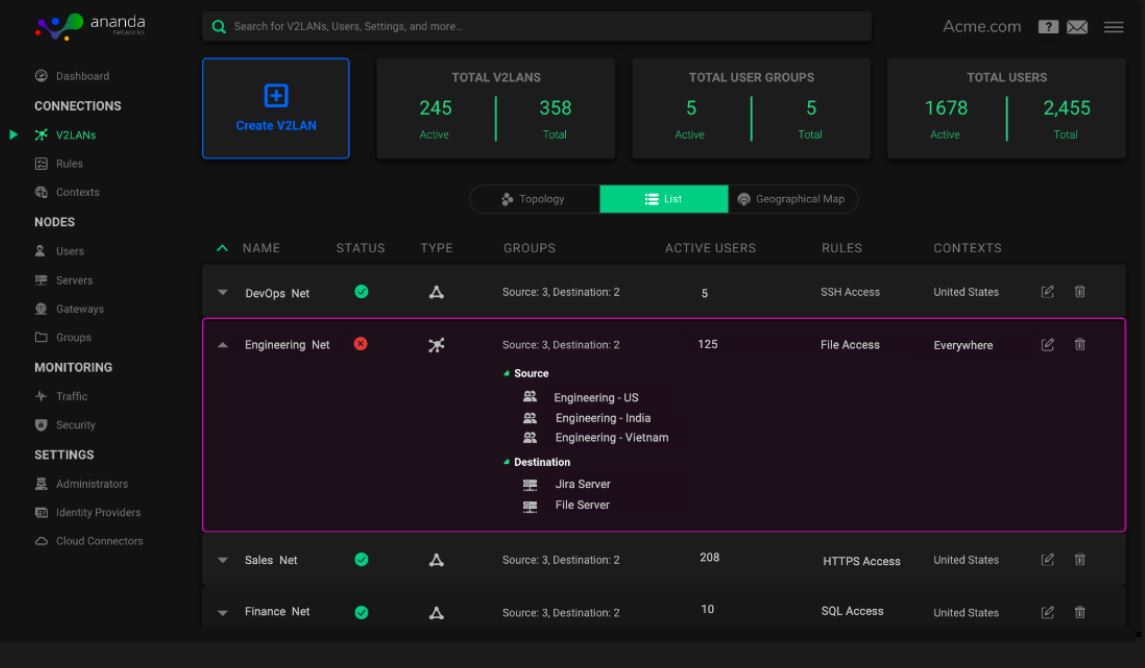 CLOUD
CLOUD
 CLOUD
CLOUD
 CLOUD
CLOUD
Ananda Networks Ltd. is emerging from stealth mode today armed with $6 million in seed funding and a new cloud-based Secure Global Local Area Network product that it says helps ensure a faster connection for remote workers and the devices and services they use.
MizMaa Ventures, Citrix Systems, Gefen Capital, Cyber Mentor Fund, GreatPoint Ventures, South Korean cybersecurity firm Jiran and J-Ventures all participated in the round, together with several individual investors.
Ananda reckons its SG-LAN network is fast enough to upend its rivals, which include legacy virtual private network, software-defined wide area network and Secure Access Service Edge or SASE providers. The key advantage is that its network services are entirely hosted in the cloud, which eliminates the need to install expensive hardware and infrastructure.
Ananda SG-LAN enables companies to create their own private networks that can connect all of their devices, users and the services they use, across their corporate headquarters, employees’ homes and the cloud. Not only that, but it promises connectivity that’s up to 60 times faster than that of rival networks. That’s because Ananda’s self-optimizing SG-LAN relies on machine learning algorithms that can ensure an optimal connection between any two nodes on the network that doesn’t backhaul traffic or force it through a proxy.
Ananda Networks co-founder and Chief Executive Adi Ruppin told SiliconANGLE in an interview that the company can deliver much faster connectivity through its use of “advanced protocols to create lightweight tunnels that are faster, less chatty and have better congestion control and scalability” as a replacement for legacy IPSEC and similar protocols.
“Our network also allows nodes to connect directly,” Ruppin said. He explained that this kind of distributed architecture is very different to the architectures that are commonly used by SASE vendors, and enables it to connect any two nodes, even if they happen to be in the same data center or cloud, and find the shortest and most optimal path from A to B.
“This is usually apparent when you look at connecting nodes in the same city or state, where backhauling the traffic through a finite number of data center locations would likely make it a much longer and therefore slower and potentially less secure path,” Ruppin added.
Ananda also claims its network is more secure than rival offerings thanks to its end-to-end data encryption. It also adopts a native zero-trust model for devices and users, and it uses a microsegmentation technique that separates and secures workloads individually.
One final advantage of Ananda is that its networks are fully cloud-managed, which means installation is as simple as setting up and using a private Slack channel or group messaging app, the company said.
Ruppin said Ananda’s network service was designed to meet the demands of remote workforces, who have much greater performance demands because of the coronavirus pandemic.
“Our software-only approach allows us to easily and incrementally help enterprises with their issues without forcing the entire organization to change the way they connect and without having to go to their data center, branches or homes and push hardware,” Ruppin said.
Support our mission to keep content open and free by engaging with theCUBE community. Join theCUBE’s Alumni Trust Network, where technology leaders connect, share intelligence and create opportunities.
Founded by tech visionaries John Furrier and Dave Vellante, SiliconANGLE Media has built a dynamic ecosystem of industry-leading digital media brands that reach 15+ million elite tech professionals. Our new proprietary theCUBE AI Video Cloud is breaking ground in audience interaction, leveraging theCUBEai.com neural network to help technology companies make data-driven decisions and stay at the forefront of industry conversations.